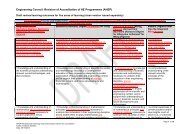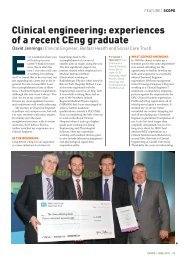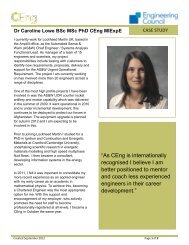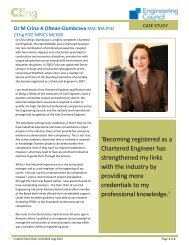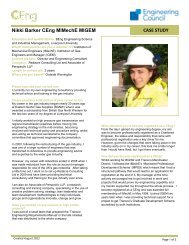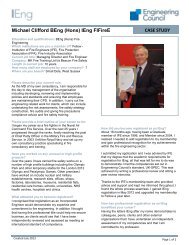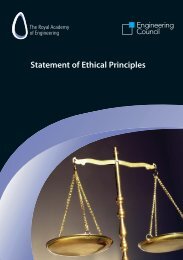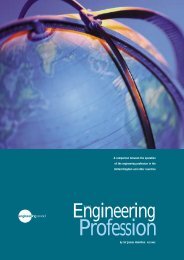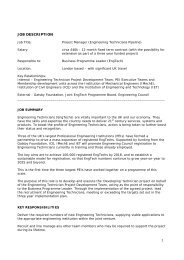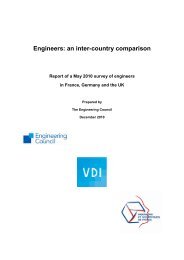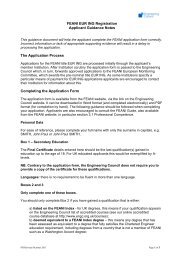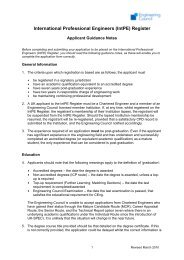An Engine for Change - A Chronicle of the Engineering Council
An Engine for Change - A Chronicle of the Engineering Council
An Engine for Change - A Chronicle of the Engineering Council
Create successful ePaper yourself
Turn your PDF publications into a flip-book with our unique Google optimized e-Paper software.
4A CHRONICLE OF THE ENGINEERING COUNCIL• 1974 – By this time <strong>the</strong> dissatisfaction is growing to <strong>the</strong> point where <strong>the</strong> “3Presidents” produce a paper proposing a new “Institution <strong>of</strong> <strong>Engine</strong>ers” (IE) that willhave directly-elected members on its Board ra<strong>the</strong>r than Institution representatives.The IE is to look after all pr<strong>of</strong>essional matters such as representation <strong>of</strong> <strong>the</strong>engineering pr<strong>of</strong>ession and will control qualifications, whilst <strong>the</strong> Institutions willconfine <strong>the</strong>mselves to advancing <strong>the</strong> state <strong>of</strong> engineering knowledge - <strong>the</strong> “learnedsociety” function. The “Big 3” reckon that, because <strong>of</strong> <strong>the</strong>ir size, <strong>the</strong> majority <strong>of</strong> <strong>the</strong>elected IE Board will come from <strong>the</strong>ir memberships. Needless to say this is not wildlyappealing to <strong>the</strong> smaller bodies and, after a number <strong>of</strong> attempts at compromise, <strong>the</strong> IEidea is dropped in favour <strong>of</strong> a relatively small adjustment to <strong>the</strong> CEI constitutionallowing its Board to contain a mix <strong>of</strong> elected and nominated members.• 1975/76 – Because <strong>of</strong> <strong>the</strong> continuing feeling that <strong>the</strong> CEI is not making <strong>the</strong> desiredimpact, calls begin to be made <strong>for</strong> a Royal Commission or o<strong>the</strong>r type <strong>of</strong> Governmentenquiry into <strong>the</strong> engineering pr<strong>of</strong>ession. These calls emanate mainly from <strong>the</strong> IEE,whose Secretary Dr George Gainsborough is particularly active, and also from <strong>the</strong>elite Fellowship <strong>of</strong> <strong>Engine</strong>ering (now <strong>the</strong> Royal Academy <strong>of</strong> <strong>Engine</strong>ering), from tradeunions, and also from some <strong>of</strong> <strong>the</strong> non-chartered engineering institutions. The TradesUnion Congress passes a unanimous resolution (in 1976) that is moved by John Lyons<strong>of</strong> <strong>the</strong> Electrical Power <strong>Engine</strong>ers’ Association. The resolution runs “Convinced that<strong>the</strong> <strong>Engine</strong>ering Pr<strong>of</strong>ession has a vital role to play in <strong>the</strong> regeneration <strong>of</strong> Britishindustry, Congress calls on <strong>the</strong> Government to set up, without delay, a powerfulCommittee <strong>of</strong> Inquiry into <strong>the</strong> role, function and use <strong>of</strong> qualified engineers in Britishindustry”. This influences Government, and <strong>the</strong> Department <strong>of</strong> Trade and Industry isdrawn into <strong>the</strong> discussions by <strong>the</strong> perception that improvements to <strong>the</strong> engineeringpr<strong>of</strong>ession’s standards and status could have a beneficial effect on <strong>the</strong> per<strong>for</strong>mance <strong>of</strong>British manufacturing industry. [Its share <strong>of</strong> GDP fell from 33 % in 1963 to 29 % in1973. Worse still, British manufacturing productivity in 1973 was less than 50% that<strong>of</strong> Japan and 40% that <strong>of</strong> <strong>the</strong> USA.]• 1977 – Although opinion both within and outside Government is not unanimously infavour, a “Committee <strong>of</strong> Inquiry into <strong>the</strong> <strong>Engine</strong>ering Pr<strong>of</strong>ession” is announced toParliament on 5 July 1977 and <strong>the</strong> inimitable Sir Montague (known by all as Monty)Finniston appointed as Chairman. Its membership [<strong>An</strong>nex A] is announced on 14December 1977. The terms <strong>of</strong> reference are, <strong>for</strong> manufacturing industry [our italics]and in <strong>the</strong> light <strong>of</strong> national economic needs, to review and make recommendations on:(a) <strong>the</strong> requirements <strong>of</strong> British industry <strong>for</strong> pr<strong>of</strong>essional and technicianengineers, <strong>the</strong> extent to which <strong>the</strong>se needs are being met, and <strong>the</strong> use beingmade <strong>of</strong> engineers by industry;(b) <strong>the</strong> role <strong>of</strong> <strong>the</strong> engineering institutions in relation to <strong>the</strong> education andqualification <strong>of</strong> engineers at pr<strong>of</strong>essional and technical level;(c) <strong>the</strong> advantages and disadvantages <strong>of</strong> statutory registration and licensing <strong>of</strong>engineers in <strong>the</strong> United Kingdom;(d) <strong>the</strong> arrangements in o<strong>the</strong>r major industrial countries, particularly in <strong>the</strong>EEC, <strong>for</strong> handling <strong>the</strong>se problems, having regard to relevant comparativestudies.© <strong>Engine</strong>ering <strong>Council</strong> UK 2004



